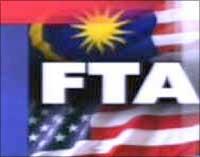 | « Back to article | Print this article |
Trade is good, India finally realises
Korean hardware prowess and Indian software prowess can result in a formidable partnership, writes Subir Roy.
In the space of two weeks India has signed two economic agreements, a broad-based trade, services and investment pact with South Korea and a free trade agreement with the ASEAN group of ten countries - agreements which have been thrashed out through protracted negotiations.
 This is a good curtain raiser for the mini-ministerial meet in Delhi next month at which India will have something to show for doing its bit for trade and helping revive the Doha round.
This is a good curtain raiser for the mini-ministerial meet in Delhi next month at which India will have something to show for doing its bit for trade and helping revive the Doha round.
ASEAN and South Korea are two different economic animals and naturally reaction in India to the two agreements has been vastly different. South Korea is a mature global technology power and its consumer electronics giants like Samsung and LG have already wiped out once promising Indian players like BPL. India and South Korea are in different leagues and are not in competition in any serious way.
Only Indian steel can one day pose a challenge to South Korea but that is a long way off and South Korea has already moved to secure its position by Posco, its national firm and global steel major, seeking to set up a huge steel plant in India. Hence, there has been no serious concern in India over lowering tariffs for Korean manufactures.
But ASEAN members are in many ways closer to us and a trade pact with them is closer to the bone. Malaysia is a leading edible oil exporter, Thailand is a low-cost manufacturer at levels of sophistication matching India's and Vietnam surprises India every day, be it in rice or software.
Indian trade bodies, representing largely manufacturers, have, after opposing the agreement for long, officially welcomed it. But expectedly, India's plantations sector is worried about the pact.
Trade sceptics have also pointed out that through this pact India has given away more than what it has gained. That is true because ASEAN members had already given away a lot, via zero import duties, even before this pact, leaving less space for incremental gain by India.
What those who take an arithmetical view of trade do not realise is that opening up to import competition in manageable doses does wonders to an economy's competitiveness. India's autarkic decades were marked by low growth, persistent poverty and endless balance of payments crises.
The last two decades have conversely been marked by high growth, burgeoning foreign exchange reserves and hopes, after the recent 8 per cent-plus growth period, of banishing poverty in a generation.
What is important about the two pacts is not so much what they immediately signal but what they portend. In the case of South Korea, India can become an export base for its manufactures which can make India's trade balance with North America, Europe and Africa look a lot rosier.
But the real gain that India can look forward to from the pact is not in manufacturing; it is services as the comparative advantage there for India is much greater. There is a market waiting in South Korea for Indian software engineers and management consultants. ASEAN can, with some effort, be made into a destination for skill-intensive Indian manufactures. More importantly, an agreement on services will probably emerge next year, thus opening up another market.
The pacts send out two other signals. One, India is serious about its 'look east' policy and is willing to take a bit of risk in cementing ties with a part of Asia that it had neglected prior to the economic regime change in 1991.
In the case of ASEAN, it is important for India to simply wave the flag. This is necessary because China already has a far more powerful presence there, driven by its economic might and strategic priorities. In the case of South Korea, the cooperation can and probably will be at a different level.
Both India and South Korea want to stand up to China as it steamrolls ahead to superpower status. By themselves the two will remain far behind but by cooperating they will reap substantial benefits. Korean hardware prowess and Indian software prowess can result in a formidable partnership.
But competing with China is not an easy task. Its leadership's ability to move fast along a chosen strategic road map usually puts it several steps ahead. Even as India signed a trade agreement with ASEAN in Bangkok, China signed an investment agreement with the same bloc in the same city, having earlier entered into a partial free trade agreement. To get anywhere, India's fractious polity must allow its leadership to move faster. The last elections appear to have done just that.
